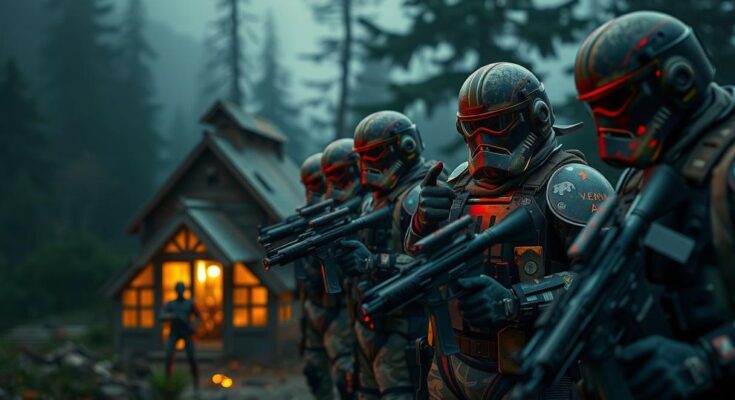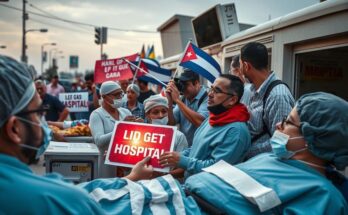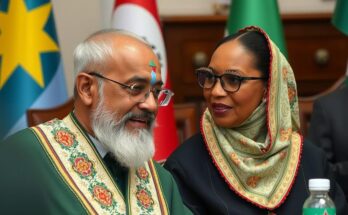The M23 rebel group, backed by Rwanda, is often perceived as merely desiring control over eastern DR Congo’s mining resources. However, extensive research reveals that its actions are deeply rooted in historical land conflicts and strategies aimed at usurping local authority. M23’s influence extends beyond mineral exploitation, as it seeks to redefine local governance structures and capitalize on economic resources through a systematized taxation regime. The complexities of this conflict necessitate nuanced solutions focused on reconciliation and sustainable peace.
The conflict instigated by the Rwandan-backed M23 rebel group is frequently characterized merely as an endeavor to seize control of the mining-rich territories of eastern Democratic Republic of Congo. Since their resurgence in 2021, M23 has successfully established control over significant regions in the southeastern part of North Kivu province, particularly encircling Goma, a key urban center. While it may seem obvious to attribute these conflicts primarily to M23 and Rwanda’s motives to directly control the resources, such interpretations fail to appreciate the broader context of the situation. As part of our ongoing research, we collaborated with local experts and civil society organizations in Goma to investigate the multifaceted dimensions of the M23 crisis. Through interviews with a diverse array of over 55 individuals, including local community members, military personnel, and shopkeepers, we unearthed insights that indicate deeper motivations behind M23’s actions. Our findings illustrate that M23’s strategy extends beyond mere mineral acquisition; it involves a concerted effort to usurp local authority and reconfigure governance structures within the areas it dominates. This includes: 1. Undermining and supplanting local customary leadership. 2. Gaining control over crucial trade passageways. 3. Enforcing a comprehensive taxation system. These initiatives facilitate M23—and by extension, Rwanda—to reap benefits from the local economy and the wealth generated by DRC’s minerals, without necessitating direct oversight of mining operations. Moreover, historical tensions and land disputes have played a significant role in the conflict, which date back to the nation’s independence in 1960. Notably, the movements of Rwandan migrants during the colonial era laid the groundwork for the current demographic and ethnic complexities in the region. Since the Congo Wars of the 1990s, Rwandophone communities have been embroiled in tensions with indigenous groups over land ownership and rights. The conflict has fostered a climate of distrust and enabled armed groups to manipulate these disputes to validate their existence and authority. M23 has emerged as a protector of Tutsi interests, particularly regarding land access, despite many Tutsi not expressly seeking its protection. The dynamics of control over land have thus been twisted, with armed groups positioning themselves as custodians of rights that many believe are threatened. In terms of governance, customary authorities are pivotal for local land management and community cohesion. M23’s tactics have involved not only targeting existing leadership but also engaging in the systematic erasure of historical claims to land through the destruction of archival records. To finance their endeavors, M23 has implemented an extensive taxation regime, collecting dues through various means—including tolls and fees—thus entrenching their authority over the populace. This extensive militification of local governance poses significant challenges for future peace efforts, as both civilians and various armed factions endure compounded taxation pressures. Mineral wealth does play a crucial role in the conflict; however, our research highlights that the roots of the crisis are historical and deeply embedded in local dynamics. Not only does M23 seek to profit indirectly from mineral supply and trade routes, benefiting its Rwandan ally, but it also aims to redefine local governance and the socio-economic landscape in North Kivu. To address the complex realities of the M23 crisis, simplistic narratives must evolve into thoughtful strategies focused on resolution and reconciliation. Sustained local dialogue and mediation will be vital in disentangling the entrenchment of militia influences, resolving longstanding land disputes, and repairing frayed intercommunity relations. This approach is essential to achieving lasting peace in North Kivu.
The article discusses the intricate conflict involving the Rwandan-backed M23 rebel group in the eastern Democratic Republic of Congo, which is often oversimplified as a struggle for control over lucrative mining resources. However, in-depth research indicates that the dynamics of the conflict are much more complex, encompassing historical land disputes and the group’s attempts to reconfigure local governance. This examination reveals the underlying motivations driving M23’s actions and their implications for the region’s stability.
In conclusion, while the control of mineral resources is significant, the M23 conflict encompasses historical land grievances, local governance disputes, and the manipulation of community dynamics. The research underscores the necessity of addressing these complexities through local engagement and mediation to foster sustainable peace in North Kivu. Long-term solutions must focus on rebuilding trust, resolving land conflicts, and dismantling the militarization of local governance to ensure stability in the region.
Original Source: www.defenceweb.co.za




